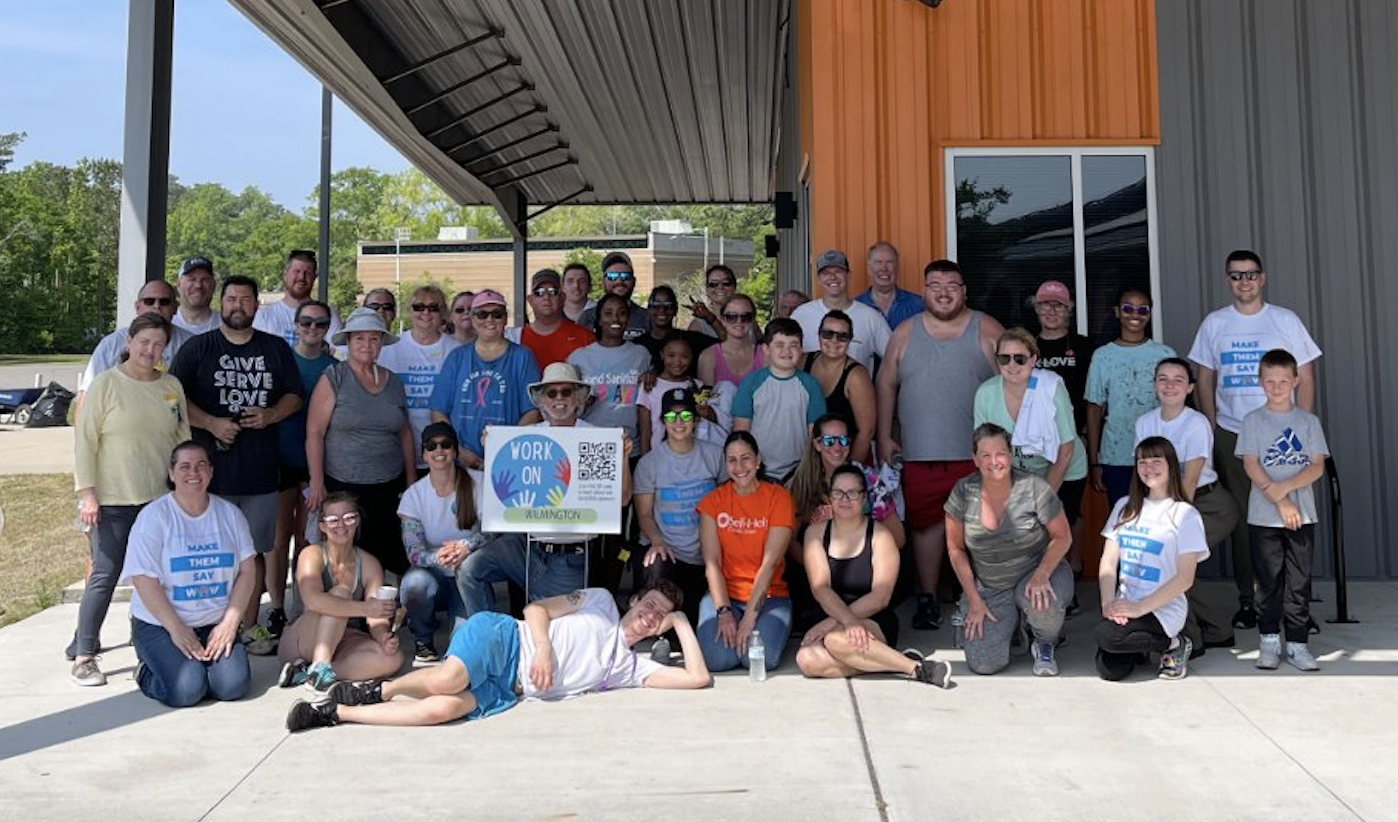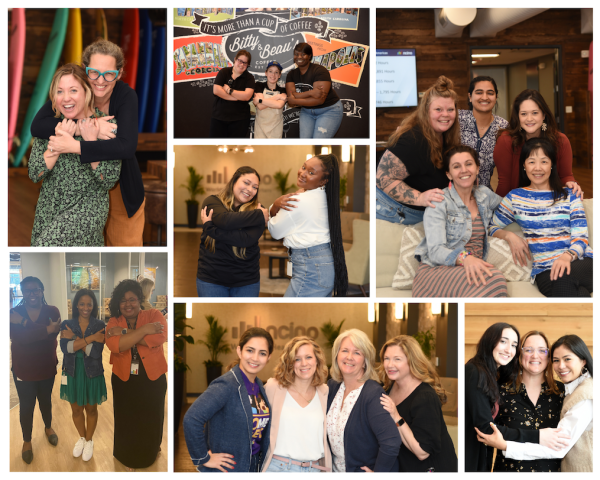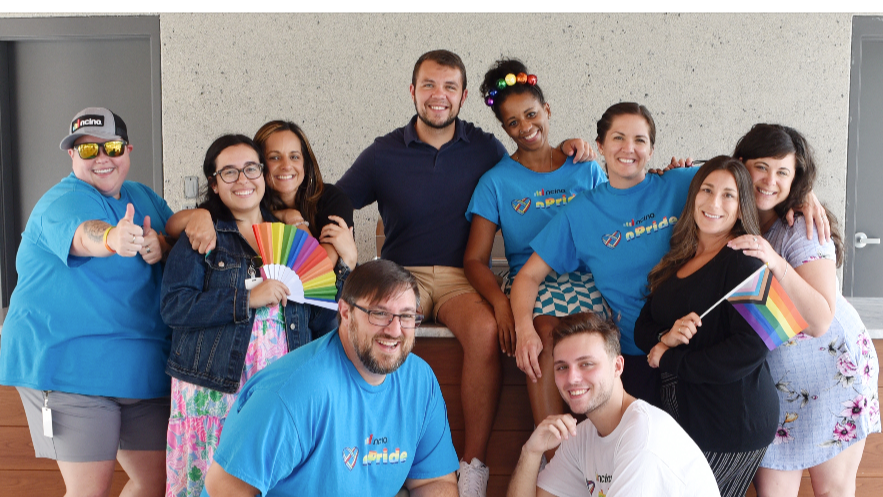What advice do you have for women who would like to be in a leadership role?
Britney Pope (Area Vice President-Strategic Solutions, US): Be an expert at something, and develop a consistent, professional brand. By being an expert at something within your field, you will always be able to add valuable contributions to your organization and help your team achieve its goals. You will earn respect professionally, which will in turn lead to leadership opportunities. In terms of branding, reflect on and understand what makes you unique and successful, and how your skills can make your organization more successful. Keep your brand in mind in every interaction. I believe the best leaders are consistent in how they show up each day and add value in individual, team and organizational interactions.
April Rieger (Chief Legal and Compliance Officer, US): Be intentional and deliberate about your career goals, but don’t cement them in stone. Who you want to be in your twenties may look different than who you want to be in your thirties or forties. It’s okay to take a detour or even set a new destination. Despite being a maniacal planner, I could never have predicted the path that led me to nCino and my dream job. Work hard. Push yourself. Be agile. Take calculated risks. Rinse and repeat.
Candace Guido (Associate Director-Engineering, US): Join the conversation and get to the point quickly. Strong communication skills and a strong network are priceless. Think big picture as you analyze problems, but remember perfection is stifling. Force confidence if you must, and don’t overanalyze the past. Look for rising stars around you and support them. Look for an edge and embrace the chess game of life. Finally, own your mistakes, talk about them openly, and give yourself a thousand breaks.
Nicole Haverly (Director-Support Engineering, US): Early in my career, I was given two points of advice I’ve held close to my heart over the years. One was ‘never say no to an opportunity to learn and grow.’ Each time I’m faced with an opportunity that seems heavy and daunting, I remind myself that growth only comes from being comfortable with the uncomfortable. The second point of advice was ‘be authentically you – do not change to conform to the ways and ideas of others,’ and wow – that takes real courage. I challenge women who are interested in taking the first step into leadership to jump in.
Katie Summering (VP-Financial Planning & Analysis, US): Know your why, get specific on your plan, and ask for help along the way. Write down why you want to be in a leadership role and keep it in plain sight to stay connected to your own motivation. Know your skills and strengths that you have to bring to the role and what about the role would define success for you. Be open to challenges outside of your comfort zone that will help you on your path, and identify opportunities to strengthen your skills. No one cares more about your success than you, so don’t be bashful about what you want.
What has been the biggest challenge you’ve faced? How did you overcome it?
Catalina Garcia (Principal Regional Marketing Manager, APAC): I have always worked in male-dominated industries. Presenting to 50 men as the only woman in the room was very intimidating—and if you add my thick Latin accent into the picture, it was horrifying! But slowly I learned to use that to my advantage. Rather than feeling bad about being and sounding different, I started to feel proud. I earned the right to be there. I told the voices inside my head to stop talking, and I concentrated on the important things I had to say.
Candace Guido: Before I had kids, I would have said working full time while completing my graduate degree. Becoming a mother changed that. I love my kids, and I love my job. Both sides are demanding, and I do my best to balance the load, but perfection is impossible. I forget wacky hair days and miss school newsletters all the time. But through all my mistakes, I know I’m doing my best to raise independent, badass women to lead the next generation. And that means setting an example for them.
What is one way men can help support their female colleagues?
April Rieger: There’s a lot of focus on the importance of women helping women (as there should be), but the positive impact that male colleagues can have on a woman’s career trajectory can’t be overstated. As I look back on my career, both at nCino and past roles, the road to my career advancements has been paved with the guidance of a handful of key mentors and bosses, most of whom were men. These men made sure I got credit for my work, set a tone of equality in meetings and work assignments, constantly pushed me outside of my comfort zone, made sure I got the seat at the table that I’d earned, and encouraged me to speak up, speak out, and speak often.
Katie Summering: Be cognizant where there is an imbalance of women representation, that women may need more encouragement to share their thoughts and opinions or to take a seat at the table. Take the opportunity to applaud their contributions to reiterate the value they bring to the workplace.
Tomoko Nagata (Marketing Manager, APAC): Find other female leaders you can trust to be your role models. There are life stage changes unique to women, so it is important to find someone to talk to and guide you when you have concerns.
Shannon van Dulken (Associate Director-Partner Relationships, EMEA): Let your female colleagues finish their thoughts. If you see another colleague speak over a female colleague, step in and ask them to let her finish. Once, a male colleague did this for me when I was struggling to be heard, and it was REVOLUTIONARY. I have never forgotten how valued that made me feel.
Britney Pope: Knowledge is power, and every person is unique. Men can support female employees by first getting to know them individually and understanding what challenges they may have in their roles (internally and externally) and what ways female colleagues would like to be supported. In addition to gaining knowledge, male colleagues can be supportive by being aware of their surroundings and being inclusive and collaborative in group settings.
The theme of this year’s International Women’s Day is #EmbraceEquity. What is one way all employees can embrace equity in the workplace?
Catalina Garcia: Make sure you have a diverse group of individuals making decisions, especially ones about workplace initiatives. Different genders, backgrounds, age and levels of seniority are important.
Tomoko Nagata: Transparency and respect are key. Transparency in a personnel evaluation and everyday work processes ensure that everyone is satisfied with their work. It is important to put yourself in the shoes of your colleagues and team and understand their backgrounds and perspectives rather than denigrating them.
Shannon van Dulken: Equality is more than just having a seat at the table; it’s having an equal seat at the table. Equality and respect go hand in hand. In order for everyone to truly be equal, there has to be a fundamental level of respect for people’s experiences, points of view, and expertise. So many times, female voices and points of view are inherently undervalued and disrespected. By taking a step back and considering another point of view, you’ll be better equipped to give them an equal seat at the table.
Thanks to these great leaders for sharing their insights, experiences, and expertise with us! We’re lucky to work with you and learn from you.
Happy International Women’s Day!





